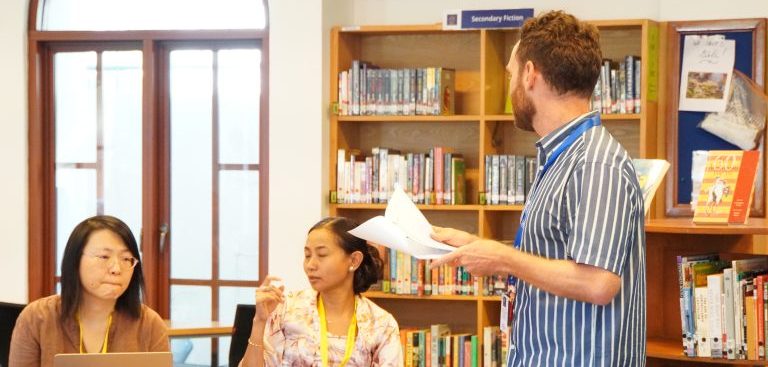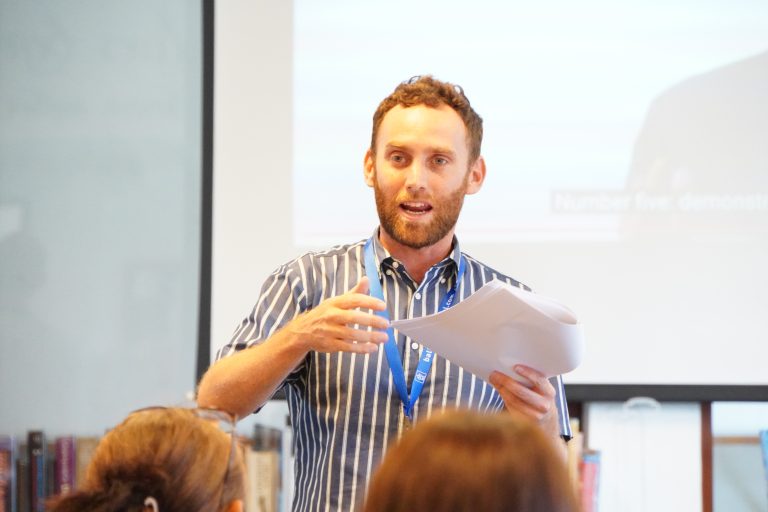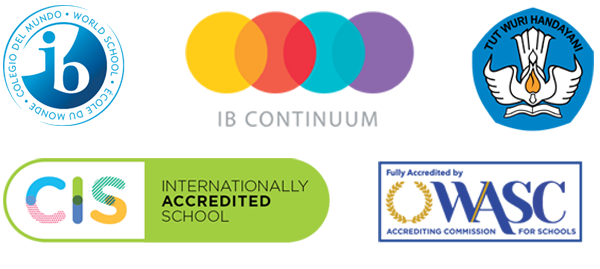World Mental Health Day

World Mental Health Day authorizes the opportunity for people and communities to unite and raise the theme ‘Mental health is a universal human right.”
In many ways, we can all take part in raising awareness and driving actions that promote and protect mental health, including children’s rights.
Let’s talk with our teachers at Bali Island School to hear what they say about World Mental Health Day!
- What is the importance of emotional well-being in the education world?
Ben:
During this Mental Health Awareness Week, let’s explore the strong connection between self-care and academic success.
Think of your brain as a garden with the prefrontal cortex as the head gardener responsible for academic success. The garden thrives when it’s balanced, just like your brain. Self-care is like nurturing the garden. It ensures nutrient-rich soil (nutrition), well-watered plants (stress management), and a peaceful atmosphere (quality sleep and social connection). These practices allow the head gardener to focus on higher functions (learning).
By practicing self-care, you become the master gardener of your mind, creating an environment where your prefrontal cortex can thrive. Remember, it’s okay to seek help when needed – we all do at times.
Meredith:
Emotional health and well-being are now more crucial in education than ever. Recent global disruptions have impacted our communities, making it our duty as members of the educational community to ensure the basic needs of teachers and students are met. Creating a secure and supportive environment is vital for effective learning. As the saying goes, we must ‘Maslow before we can Bloom.’ By addressing the whole child’s needs, including emotional and social well-being, we enable a joyous and holistic learning experience that encompasses not only academics but also important life skills. Our responsibility is to equip our students with the social and emotional support needed for them to become curious and enthusiastic learners, who thrive in today’s world.
Sri:
Emotional well-being is of paramount importance in the education world. It has a pivotal role in the overall success and development of students. When students feel emotionally healthy, balanced, secure, and supported, they are better able to focus on their studies, absorb information, collaborate with their peers, overcome challenges, and perform at their best academically and personally. Thus, emotional well-being is a foundation for preparation for life and effective education.
- As the school counselor, how do you familiarise mental health and well-being among parents, students, and teachers?
Ben:
As a school counselor, I familiarise myself with the students’ well-being and mental health needs through a multi-faceted approach. I conduct one-on-one sessions with students, providing a confidential space for them to share their concerns and emotions. Building trust through strict confidentiality is essential for open communication about sensitive topics. However, if a safety concern arises, I access further support for the person I am working with. I organise group counseling sessions and workshops to address common issues and gauge collective mental health needs. Collaboration with teachers is also essential, as they offer insights into student progress and emotional well-being. Additionally, I actively involve parents through meetings and workshops to understand their children’s needs and provide guidance on supporting their child’s mental health. I also administer surveys to collect quantitative data on the overall well-being of the student population.

- How can we promote mental health better in our daily lives?
Ben:
Mental Health Awareness Week is a valuable opportunity, but remember, mental health is a daily concern. By practicing self-care and encouraging others, we create a compassionate community where mental health is a priority.
Together, we can make a positive impact by fostering open conversations, prioritizing self-care, and offering support. Let’s be mindful of stress, seek help when needed, and break the stigma surrounding mental health to create an environment where everyone can thrive emotionally and mentally.
Meredith:
I love the word from the IB Learner Profile- Balance. I think this is so important to find that balance between school or work and finding time to do what you love. Balance is a crucial concept, and we must find it between our responsibilities and our passions. It’s vital for students and parents to prioritize their interests, providing a source of recharge. Additionally, spending less time on screens and more time in nature, taking advantage of Bali’s beauty, is essential. While technology has its place in education, finding that balance between screen time for learning and downtime is pivotal for our children’s and our own emotional well-being.
Sri:
As an IB Continuum school, we prioritize fostering the IB learner profiles of our students, with ‘balanced’ being one of the key traits. This aligns with our commitment to promoting mental health, emphasizing that being balanced means taking care of our physical, mental, and spiritual well-being.
We can promote mental health through self-love and self-care strategies, such as:
- Practicing mindfulness and gratitude.
- Setting healthy boundaries.
- Embracing our true selves, acknowledging both strengths and areas for growth.
For self-care, we can maintain a healthy and balanced lifestyle, manage stress, limit screen time, engage in regular physical activity, explore our passions, and stay connected with friends and family.”



